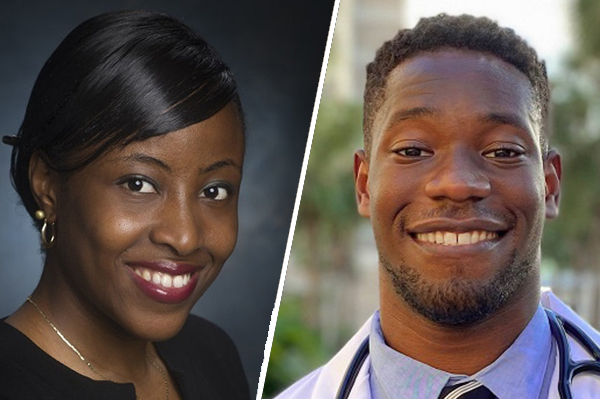
Galveston medical student Tsola Efejuku was raised by a family of health care professionals. His mom is a pharmacist, one of his uncles is a physician, and another is a physical therapist. This early exposure piqued his interest in the field. But outside of his family, he found little reinforcement.
“I didn’t see too many [other] Black physicians,” he said. “If you can’t see it, it can be hard to envision yourself there.”
This is, unfortunately, a common experience among Black medical school students and young physicians. In 2020, 6.3% of active physicians in Texas identified as Black or African American, compared with 13.4% of the state population, according to the Association of American Medical Colleges’ 2021 State Physician Workforce Data Report and the U.S. Census Bureau.
Mr. Efejuku, now a second-year student at The University of Texas Medical Branch School of Medicine, and others say this disparity has prompted them to embark on twin careers in medicine and advocacy in hopes of closing the gap.
In his involvement in equity and diversity issues through organized medicine, Mr. Efejuku hopes not only to increase representation of Black physicians, but also to help strengthen outreach to marginalized communities, whose members have long been denied equitable access to health care and continue to deal with racism and unconscious bias in medical research.
“Increasing diversity and equity in medicine is really important,” he said, adding that minority patients stand to benefit when their physicians empathize with and look like them.
Fredricka Barr, MD, a family medicine physician in Austin and current Texas Medical Association Leadership College scholar, knows this firsthand. She says her Black patients are more trusting of her care because of their shared backgrounds. “There’s a sense of relaxation and understanding,” she said.
But more Black physicians are needed to ensure Black patients feel represented.
Valentine Alia, a second-year medical student at The University of Texas Rio Grande Valley (UTRGV) School of Medicine, didn’t consider medicine as a career until his four-year stint as a nurse in a Houston county hospital’s emergency department. There, he saw firsthand that the patients with the worst outcomes tended to be those who were least represented among health care professionals. Now, as president of the TMA/American Medical Association Medical Student Section chapter at UTRGV, he advocates for health equity and maintains hope that all patients will soon feel represented as the physician workforce grows more diverse.
“I’m hoping to change statistics with my own pursuit of medicine,” he said.
Fatimah Bello, MD, an Edinburg internist and TMA Leadership College alumna, aims to spark similar ambitions through her community health advocacy in underserved communities. This work strengthens access to care as well as exposes young people in those communities to medicine as a possible career path.
“Many of them have heard, ‘This is not for Black people,’” she said of medicine. “I want to encourage them out of that mentality.”
Dr. Bello would have benefited from this kind of mentorship. Growing up in Nigeria, she was involved in her family’s health care from a young age, serving as a translator for relatives, accompanying them to visits, and reading doctors’ reports. Feeling called to medicine, she made her way through medical school at The University of Nigeria College of Medicine and through residency at UTRGV without much help.
“If I had mentors earlier, my journey would have been much easier than it was,” she said. “So many things I had to figure out on my own.”
Another challenge when it comes to increasing representation among Black physicians is recruitment at the leadership level. Bright Odei, MD, a family physician in Harlingen, was drawn to advocacy as a medical school student in his native Ghana, where there was a shortage of doctors at the time. “In Ghana, you have a lot of leverage as a physician, if you want to do advocacy,” he said. “The doors are always open to you.”
Dr. Odei immigrated to the U.S. in 2010, completing his residency at the Southern Illinois University Center for Family Medicine before moving to Texas. Here, he feels the proverbial door is less open to aspiring Black physician advocates than in Ghana, “a Black country, where [Black physicians are] in the majority.”
He would like to see TMA strengthen its recruiting efforts among medical school students and residents of all backgrounds, especially with the ongoing pandemic complicating in-person meetings, to ensure others have the same opportunities he has had. “Advocacy has always been part of my life,” he said.